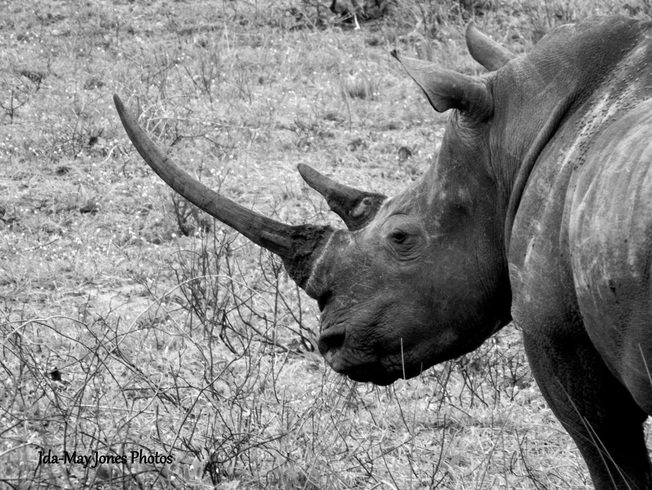|
The state of rhino poaching across Africa is out of control. The numbers of rhinos poached each year has risen dramatically: in the year 2000 just seven rhino's were poached in South Africa... last year (2012) the number was a horrifying six hundred and sixty eight. So far this year there has already been over four hundred and eight - that is more than two rhinos a day slaughtered for Eastern European... people (insert own noun as required). Already the Northern White Rhino has become extinct in the wild and there are only three left in captivity... all because of poaching. Things have become critical and hard action needs to be taken. This post will look at the methods that are being employed to save the rhinos and what might be the best option.  1) DE-HORNING: De-horning rhinos seems like the simple solution - if there is no horn for the poachers to take then surely they will be saved? There are several problems with this, first and foremost is that if a poacher has spent several hours tracking a rhino to find it has no horn they kill it anyway, just so they won't have to track it again. Also, horn is so valuable now that even the smallest end left is worth taking - it might not be the big bucks but pound for pound it is worth more in its weight than gold or cocaine. Another problem is that rhino horn re-grows and so each individual would have to be darted over and over (which is pretty bad for their health) and have their horn removed. It also affects the rhino behaviour - males can no longer fight and attraction is lost for females... In the long run this could severely affect how the animals behave and who they choose for mates. As well as this it is highly impractical for larger reserves such as Kruger National Park, for whom it would cost a fortune just to find all the rhinos, not to mention dart and remove their horn. 2) LEGALISING AND FLOODING THE MARKET Another solution that is largely in debate is to legalise the sale of rhino horn and, using the huge stock piles of horn that has legally been collected over the years, flood the market at such a low price that rhino horn is no longer worth the risk for poachers. However this was tried with the ivory trade and the problem is that it re-created the market and people who didn't buy before began to want ivory. It could not be provided on a sustainable level and so created even more trade for poachers. 3) FARMING RHINOS Along a similar line is the idea of farming rhinos for their horn. Since it grows back (as do our finger nails, which coincidently are made up of all the same properties) it would be viable to have a farm of rhinos and regularly remove their horn for sale. This just seems such a sad solution for me - these ancient wild animals reduced to being farmed. And again it causes the issue of creating more of a market than can be provided for. 4) RHINO GUARDS In several areas rhinos have their own personal body guards who stay with them 24/7. This is something poachers cannot get around and is a great way to protect them - guarded rhinos don't get killed. But this is such an expensive way for protection and can only be done for a lucky few... There is no way personal guards can be set up for every rhino in Africa! And again it just seems so sad that these animals cannot be truly wild and go about as they wish... 5) POISONING HORNS On a couple of reserves in South Africa saving the rhino species has resorted to injecting their horns with a poison which, if consumed, will make someone very ill with stomach ache and severe diarrhoea. As a warning to potential poachers the horn is also injected with a visible pink dye which is also detectable through airport customs (even if ground to a fine powder). So far all rhinos that have been treated with poisoned horn have remained unharmed, and so this seems like a great solution. It in no way affects the rhino in health or behaviour patterns. But it also begs some of the same issues as de-horning; if a poacher tracks a poisoned rhino he is likely to kill it so as not to track it again, and larger areas such as Kruger are unable to do this to all their rhinos and so if all other areas poison their horns the killing would just become concentrated to areas such as Kruger. It is also likely that those selling rhino horn will find a method of bleaching the horn and continue to sell it to unaware consumers and continue to rake in profits (although if enough become sick from consuming horn perhaps it would deter them?). Every solution has its positive and negative side affects. The main issue is cost and practicality - sadly the best solutions are not really feasible. But one thing is unquestionable, and that is that immediate action must be taken. Rhinos must be saved. Added note - my friend Angie, who is in charge of Thandi's Fund Raiser Facebook Page, (raising money in the name of a rhino who was saved from a poaching attack - https://www.facebook.com/ThandisFundRaiser) linked me to another method ongoing which you can read about here: http://www.defenceweb.co.za/index.php?option=com_content&view=article&id=30851%3Arise-of-the-anti-rhino-poaching-drones&catid=48%3Adefence-technology&Itemid=109
0 Comments
Leave a Reply. |
